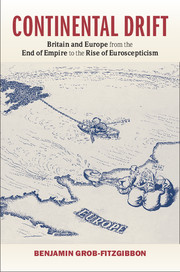Book contents
- Frontmatter
- Dedication
- Contents
- Acknowledgements
- List of abbreviations
- Introduction
- Part 1 Imperial Europeans
- Part 2 Post-imperial Eurosceptics
- 10 At sixes and sevens
- 11 Towards the Common Market
- 12 The rise of the anti-Marketeers
- 13 Empire eclipsed, Europe embraced, Britain rejected
- 14 Entering the promised land? Britain joins ‘Europe’
- 15 Seasons of discontent
- 16 Half-hearted Europeans
- 17 Mrs Thatcher, John Major and the road to European Union
- Conclusion: Post-imperial Britain and the rise of Euroscepticism
- Notes
- Bibliography
- Index
12 - The rise of the anti-Marketeers
from Part 2 - Post-imperial Eurosceptics
Published online by Cambridge University Press: 05 May 2016
- Frontmatter
- Dedication
- Contents
- Acknowledgements
- List of abbreviations
- Introduction
- Part 1 Imperial Europeans
- Part 2 Post-imperial Eurosceptics
- 10 At sixes and sevens
- 11 Towards the Common Market
- 12 The rise of the anti-Marketeers
- 13 Empire eclipsed, Europe embraced, Britain rejected
- 14 Entering the promised land? Britain joins ‘Europe’
- 15 Seasons of discontent
- 16 Half-hearted Europeans
- 17 Mrs Thatcher, John Major and the road to European Union
- Conclusion: Post-imperial Britain and the rise of Euroscepticism
- Notes
- Bibliography
- Index
Summary
A week before the House of Commons’ vote authorising negotiations for entry into the Common Market, Sir Derek Walker-Smith (Minister of Health from 1957 to 1960), Robert Turton (Minister of Health from 1955 to 1957) and Hamar Nicholls (Parliamentary Secretary at the Ministry of Agriculture from 1955 to 1957), supported by the Conservatives Lord Hinchingbrooke, John Biggs-Davidson and Anthony Fell, tabled a motion in the House expressing their ‘fear’ that British sovereignty would be imperilled by an entry into the European Economic Community (EEC). In all, forty-nine Conservatives signed the motion. Although many of these were unwilling to defy the government in the debate that followed, Fell did vote in opposition and a further twenty Conservative MPs abstained. This motion and the subsequent abstentions signalled the first organised attempt in the House of Commons to oppose the government's European policy. Ironically, it came from the Conservative rather than the Labour benches.
It was not only in the House of Commons that rumblings were stirring. On the day of the vote, Anthony Montague Browne sent to Philip de Zuleuta a copy of a letter delivered to Winston Churchill, which Browne claimed was ‘typical of many being addressed to Sir Winston’. The letter-writer purported to be ‘worried to death lest we join the Common Market’, which she thought ‘inevitably means the end of the Commonwealth which is dreadful to contemplate’. She continued, ‘Is Mr. Macmillan out of his mind and has he no feeling for our country, sovereign rights and world prestige? … I feel it will be nothing less than a tragedy to upset Canada, Australia, New Zealand and other countries linked with us’. Churchill himself was doing little to dissuade those who wrote to him, telling the chairman of the Woodford Division Conservative Association that although Britain ‘might well play a great part in these developments [on the continent] to the profit not only of ourselves, but of our European friends also’, Britain nevertheless had ‘another role which we cannot abdicate: that of leader of the British Commonwealth’. Churchill's vision of Europe, he said, ‘had never contemplated the diminution of the Commonwealth’, instead favouring a united European Commonwealth. If Britain's European policy were to come into conflict with its support for the Commonwealth, Churchill would choose the Empire and Commonwealth over Europe every time.
- Type
- Chapter
- Information
- Continental DriftBritain and Europe from the End of Empire to the Rise of Euroscepticism, pp. 277 - 300Publisher: Cambridge University PressPrint publication year: 2016



